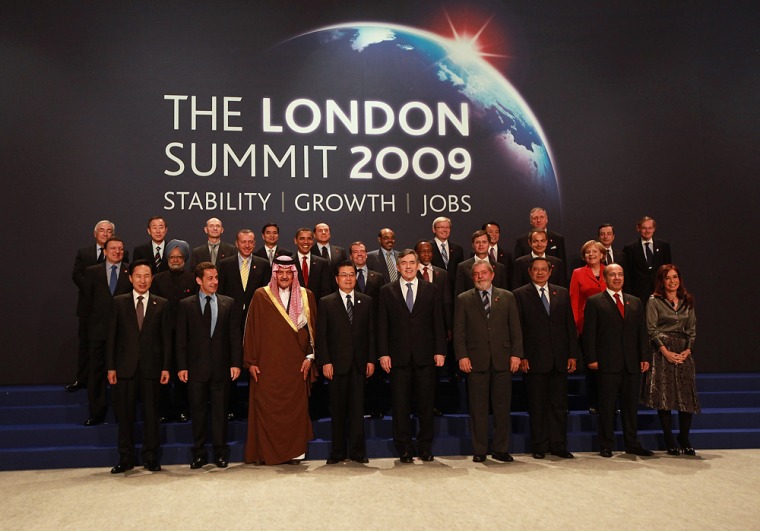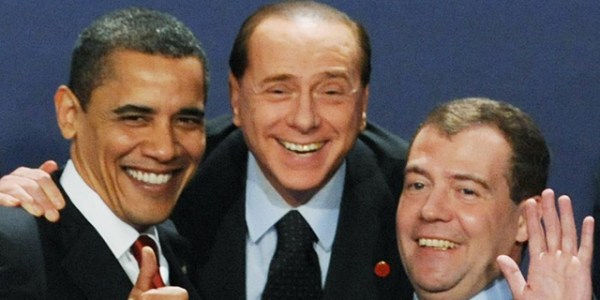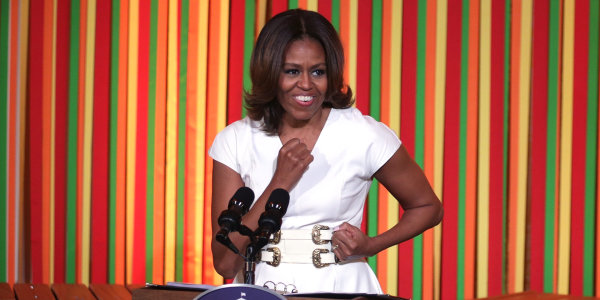Concluding his first international summit, President Barack Obama hailed agreements at the emergency meeting of world powers Thursday as a "turning point in our pursuit of global economic recovery." But he cautioned, "There are no guarantees."
Obama said the heads of industrial countries that met in London agreed on "unprecedented steps to restore growth and prevent a crisis like this from happening again."
He spoke shortly after G-20 leaders pledged an additional $1.1 trillion in financing to the International Monetary Fund and other global institutions and declared a crackdown on tax havens and hedge funds. The leaders announced the creation of a supervisory body to flag problems in the global financial system — but did not satisfy calls from the U.S. and others for new stimulus measures.
Despite that failure, OBama called the one-day London gathering "very productive" and historic because of the scope of the challenges the world faces in righting the economic crisis that's wreaking havoc on virtually every country.
"The challenge is clear. The global economy is contracting," Obama said.
'Asleep at the switch'
In a one-hour news conference packed with media from around the world, Obama said that "we're starting to see some restoration of America's standing in the world." He had been asked about diminished esteem under his predecessor, George W. Bush.
"I do not buy into the notion that America can't lead in the world," Obama said, but he added that it is "very important for us to be able to forge partnerships as opposed to dictating solutions."
He acknowledged that some participants during the summit made comments that seemed to blame America and Wall Street for triggering the crisis that has spread around the world.
"It's hard to deny that some of the contagion did start on Wall Street," Obama said, asserting that some firms took "wild and unjustified risks" and some government regulators were "asleep at the switch."
Slideshow 35 photos
Eye on G-20
But he said there were problems in other parts of the world as well.
As for the summit, he praised the G-20 nations for rejecting protectionism that hampers foreign trade and could deepen the economic crisis, and he urged global unity, saying, "We owe it to all of our citizens to act."
Still, he said, "it is hard for 20 heads of state to bridge our differences."
"I think we did OK," he said. "When I came here it was with the intention of listening and learning but also providing American leadership."
In a communique capping the dramatic one-day gathering, the leaders of the Group of 20 nations announced the creation of a supervisory body to flag problems in the global financial system.
They also bridged the gap between the U.S. and some European nations over how far to regulate the market and curb the excesses that sparked the global economic crisis.
"Today the largest countries of the world have agreed on a global plan for economic recovery and reform," said the host, British Prime Minister Gordon Brown. His announcement was quickly followed by similar ones by the French and German leaders.
French President Nicolas Sarkozy, who earlier had threatened earlier to walk out if unsatisfied with the outcome, also praised Obama.
"There were moments of tension," Sarkozy said. "Never would we have thought to get as big an agreement."
German Chancellor Angela Merkel called the measures "a very, very good, almost historic compromise" that will give the world "a clear financial markets architecture."
No panaceaObama said the document the G-20 produced and actions that will follow "reflect a range of our priorities."
"We wanted to make sure we had a strong, coordinated response to growth" and "we thought it was important we had a strong, coordinated regulatory response," Obama said — and added that both were achieved.
When asked, however, he could not point to an individual summit accomplishment that would help recession-battered Americans beyond general points such as fighting protectionism and making the global economy work together.
"This is not a panacea, but it is a critical step," Obama said.
He declined to specify where the White House compromised, saying the final communique reflected a consensus of world leaders.
"Each country has its own quirks or issues that a leader may decide was really really important," Obama said.
He said he was committed to "forging a consensus instead of dictating our terms" and argued that the United States acting alone would only be "halfway effective, not even half."
Protests continueAs leaders met in the Docklands, a former shipping area on the Thames river that was redeveloped as an international business center, protesters staged a second day of demonstrations.
Police were out in force, swarming the east London riverside site as small groups of demonstrators protested world poverty and climate change. A French daredevil scaled a London insurance building to unfurl a banner, entertaining people on the ground.
Outside the summit venue, dozens demonstrated with signs that read "Stop Ethiopia from Starving."
Other protesters sat and played a giant Monopoly game near the London Stock Exchange.
"The question is of course who has got the monopoly? It is fairly obvious the G-20 are the global financial elite," said protester Clare Smith, 27.
More than 110 people have been arrested, most of them Wednesday, when some protesters broke into the Royal Bank of Scotland building and vandalized the Bank of England building.
Whirlwind trip
On his weeklong European trip, meanwhile, Obama also met privately with other heads of state on the sidelines of the summit.
Slideshow 26 photos
Michelle Obama’s effortless style
He said he had had productive talks with leaders of Russia, China, Great Britain and India, on topics that included ways to "reduce the nuclear threat" throughout the world. He called for a coordinated response to North Korea's plans to launch a multistage rocket in the coming days.
Earlier Thursday, Obama and South Korean President Lee Myung-bak agreed on a need "for a stern, united response from the international community" in light of North Korea's efforts toward a threatened satellite launch, and the White House announced that Lee would visit Obama in Washington on June 16.
Officials said the two leaders also discussed a free-trade pact between the countries that would slash tariffs and other barriers to trade.
Obama has hinted he might seek to renegotiate a 2007 deal between South Korea and the U.S. that was hammered out under former President Bush but that legislators in the two countries failed to ratify amid opposition from farmers and labor groups.
Obama also met on Thursday with Indian Prime Minister Manmohan Singh to discuss, among other things, how to work together to curb the threat of terrorism emanating from India's neighbor, Pakistan.
Obama said it "may make sense to create a more effective dialogue between India and Pakistan."
Obama wouldn't declare that the steps the G-20 took would prevent a deeper recession.
"In life there are no guarantees; in economics there are no guarantees," he said.
The G-20 leaders also said that developing nations — hard-hit and long complaining of marginalization — would get a greater say in world economic affairs. They said they would renounce protectionism and pledged $250 billion in trade finance over the next two years — a key measure to help struggling developing countries.
The leaders also agreed to new rules on linking executive pay to performance, Brown said.


